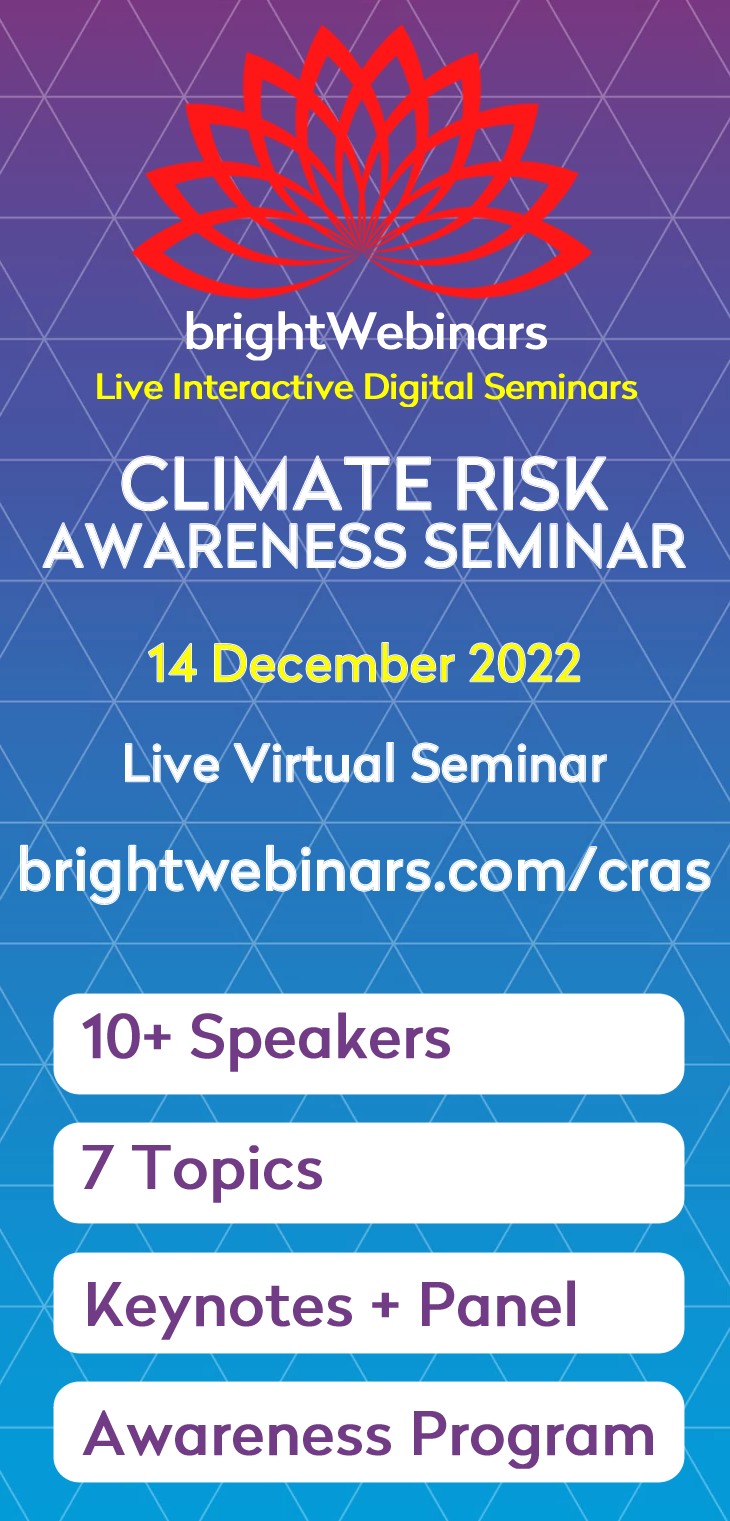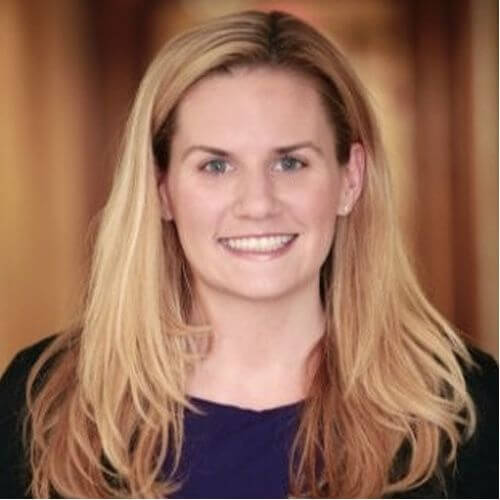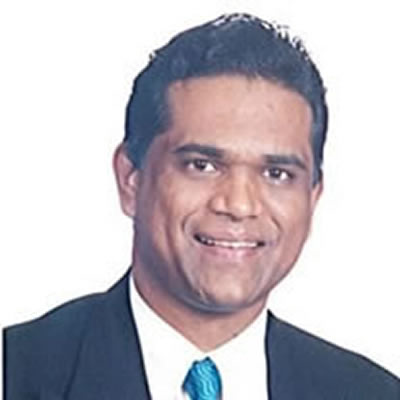Climate Risk Awareness Seminar
Impact of Climate Risk on Financial Institutions - An Awareness Program
10+
Formidable Growth Experts
7
HANDPICKED VIRTUAL TOPICS
1
DAY OF AWARENESS
TIME TO TAKE THIS SERIOUSLY
This December, we will get into the habit of raising awareness on the Impact of Climate Change Risk on Financial Institutions

Climate change is real. Or at least the measures being taken by Governments to combat climate change are most certainly real.
The COP26 witnessed many heads of state committing very aggressive targets for their countries to reach net-zero emissions. But the goal – even if a few decades distant – will have profound implications for the global economy, requiring massive investment in its renewables sector and into a nascent hydrogen economy. It also implies the withering of a fossil-fuel sector that meets around 85% of the world’s primary energy demand.The finance sector will be central to this transition. and it requires new ways of thinking about lending and risk management. Understanding what climate change is and what it means for a banking or insurance business is therefore a critical function for the finance professional. This is fairly new to many banks, insurance providers and large borrowers.
Roshcomm is pleased to present “The Impact of Climate Risk on Financial Institutions – An Awareness Program”, an online Seminar for the busy professional. This Seminar is all you need to attend to look at your potential climate-related risk exposures, to get you aware of these potential risks and to conduct scenario analysis which, in turn, allows you to begin to make decisions to change your portfolios This Webinar will help the regulator, bank management, insurance providers, risk management professionals and large organisations understand the climate and environmental risks faced by them. Once the impact of Climate risk is well understood, the organisations can then take steps to ensure it has the governance in place to manage those risks. From entrepreneurs to administrators, regulators, bank management, insurance providers, risk management professionals, large organisations and policymakers, all of our attendees are looking to stay on top of the latest trends, meet their next climate obligation, and connect with other people interested in the future of managing and preparing for risks related to climate change, innovation, learning, strategy and imagination.
What about You?
AGENDA
The Virtual Seminar will feature multiple sessions including Keynotes, Panel Discussions and Fireside Chat, Q&A sessions and will be moderated by the Track leader.
Please note: All times are Arab Standard Time (GMT +3)
Virtual Event start at: 10:00AM (Bahrain, Riyadh); 11:00AM (Dubai); 8:00AM (London); 2:00AM (New York);
Climate change poses the biggest long-term threat to the global economy. If no mitigating action is taken, global temperatures could rise by more than 3°C and the world economy could shrink by 18% in the next 30 years. This session will cover the key trends from regulators and industry with regards to Climate Risk subject
Climate alignment is the process of bringing the global economy’s emissions in line with 1.5°C temperature targets. Every actor in the global economy has a role to play in this transition. In practice, achieving net-zero emissions in the real economy will require scaling up low-carbon solutions while transitioning high-carbon assets and companies across global sectors. This includes carbon-intensive sectors where abatement remains especially difficult. As global climate ambition increases and net-zero commitments proliferate, climate alignment is establishing a new paradigm for the financial sector with redefined expectations around the role for financial institutions in advancing the net-zero transition.
Climate change is real. Or at least the measures being taken by Governments to combat climate change are most certainly real. The COP26 witnessed many heads of state committing very aggressive targets for their countries to reach net-zero emissions. But the goal – even if a few decades distant – will have profound implications for the global economy, requiring massive investment in its renewables sector and into a nascent hydrogen economy. It also implies the withering of a fossil-fuel sector that meets around 85% of the world’s primary energy demand. The finance sector will be central to this transition. and it requires new ways of thinking about lending and risk management.
Sustainability guidance and reporting frameworks play an important role in promoting transparency between organizations and their stakeholders. In recognition that climate change presents a significant risk to the global financial sector, which experts have estimated at USD$5 trillion in potential losses, TCFD, one such framework, is a guidance framework that helps companies disclose climate-related financial risks to investors, lenders, and insurers. TCFD recommendations are focused on governance, strategy, risk management, and metrics and targets.
TCFD, or Task Force on Climate-related Financial Disclosures, was created by the Financial Stability Board (FSB) in recognition that climate change presents a significant risk to the global financial sector, which they have estimated at USD$5 trillion in potential losses. The Task Force was created in December of 2015 as part of the finance industry’s response to the Global Financial Crisis, with a remit to identify and manage risks to the financial sector. The FSB is an international body that aims to protect the global financial system, so the focus on climate-related impacts to the sector is particularly significant. This body then reported its final report in 2017, which included the eleven recommended disclosures which guide TCFD reporting, TCFD is made up of 31 Task Force embers drawn from some of the world’s largest financial institutions across the G20.
As they seek to become effective managers of climate risk, banks need to quantify climate factors across the business and put in place the tools and processes needed to take advantage of them effectively. At the same time, they must ensure that their operations are aligned with the demands of external stakeholders. Five principles will support this transformation. They should be applied flexibly as the regulatory landscape changes.
Learn about the latest climate data analysis tools and how they can help us understand the full story of our relationship with the planet. A key step in the development of climate change stress testing is identifying the relationship between the climate risk factors, both transition and physical (e.g. carbon tax policy, temperature change) and financial information (e.g. provision).
TOPICS
The Virtual Seminar will feature multiple sessions including Keynotes, Panel Discussions and Fireside Chat, Q&A sessions and will be moderated by the Track leader. Complete Agenda will be available in good time
Climate change poses the biggest long-term threat to the global economy. If no mitigating action is taken, global temperatures could rise by more than 3°C and the world economy could shrink by 18% in the next 30 years
Climate alignment is the process of bringing the global economy’s emissions in line with 1.5°C temperature targets. Every actor in the global economy has a role to play in this transition. In practice, achieving net-zero emissions in the real economy will require scaling up low-carbon solutions while transitioning high-carbon assets and companies across global sectors. This includes carbon-intensive sectors where abatement remains especially difficult. As global climate ambition increases and net-zero commitments proliferate, climate alignment is establishing a new paradigm for the financial sector with redefined expectations around the role for financial institutions in advancing the net-zero transition.
Sustainability guidance and reporting frameworks play an important role in promoting transparency between organizations and their stakeholders. In recognition that climate change presents a significant risk to the global financial sector, which experts have estimated at USD$5 trillion in potential losses, TCFD, one such framework, is a guidance framework that helps companies disclose climate-related financial risks to investors, lenders, and insurers. TCFD recommendations are focused on governance, strategy, risk management, and metrics and targets.
TCFD, or Task Force on Climate-related Financial Disclosures, was created by the Financial Stability Board (FSB) in recognition that climate change presents a significant risk to the global financial sector, which they have estimated at USD$5 trillion in potential losses. The Task Force was created in December of 2015 as part of the finance industry’s response to the Global Financial Crisis, with a remit to identify and manage risks to the financial sector. The FSB is an international body that aims to protect the global financial system, so the focus on climate-related impacts to the sector is particularly significant. This body then reported its final report in 2017, which included the eleven recommended disclosures which guide TCFD reporting, TCFD is made up of 31 Task Force embers drawn from some of the world’s largest financial institutions across the G20.
As they seek to become effective managers of climate risk, banks need to quantify climate factors across the business and put in place the tools and processes needed to take advantage of them effectively. At the same time, they must ensure that their operations are aligned with the demands of external stakeholders. Five principles will support this transformation. They should be applied flexibly as the regulatory landscape changes.
Learn about the latest climate data analysis tools and how they can help us understand the full story of our relationship with the planet.
A key step in the development of climate change stress testing is identifying the relationship between the climate risk factors, both transition and physical (e.g. carbon tax policy, temperature change) and financial information (e.g. provision).
SPREAD THE CHEER. SHARE YOUR KNOWLEDGE
SPEAK @ CRAS2022
This year's Conference is pure Climate Risk. There are 10+ speakers in our program and 7 practical topics, and a sales pitch won’t be one of them. Genuine, honest and personal stories of pure Climate Change, Sustainability and Climate Risk only. Speakers, Topics, Agenda will be published in good time. Please remember to check back here for updated information or simply fill in your email address to be be notified.
At the Climate Risk Awareness Seminar, we inform, inspire, and connect people who love to combat all risks related to climate change. If you’re a thought leader, share our goal and you’d like to speak at #CRAS2022, we would love to hear from you.
Looking to Partner with us?
Looking for an audience of switched on Professionals who are keen to leverage new products?
You're in the right place. Get the Sponsorship Deck
LET'S GROW TOGETHER
SPONSORS & PARTNERS
Looking for an audience of switched on Professionals who are keen to leverage new products? You're in the right place. Leave your email address to explore our partnership opportunities.
Look Who's Talking
Check out some of the amazing testimonials from our delegates!
I participate in a lot of HR events but I would rank this event in the top category
Speakers were amazing and did a great job in sharing their experiences with us. I would definitely be interested in a ?Part Two? for the workshops to discuss best practices for companies to follow.
The awards concept was a superb idea to get more recognition in the market via the media and PR.
This was a GREAT event. The people organizing it are the best in class and I have no feedback for them other than thank you for looking after us all so well and making time for us when needed.



















